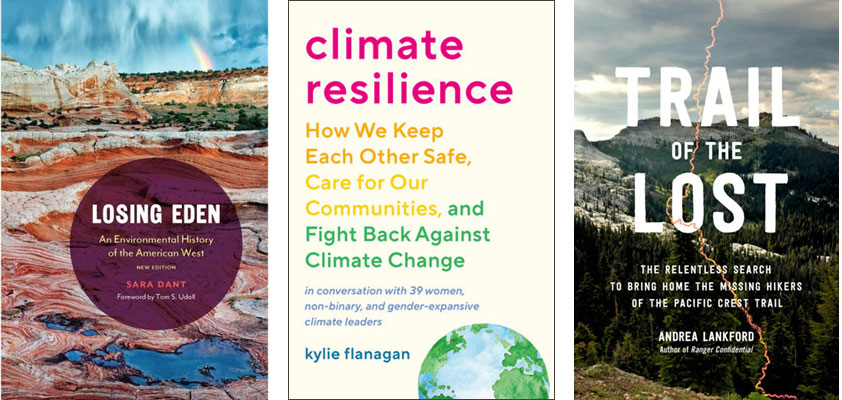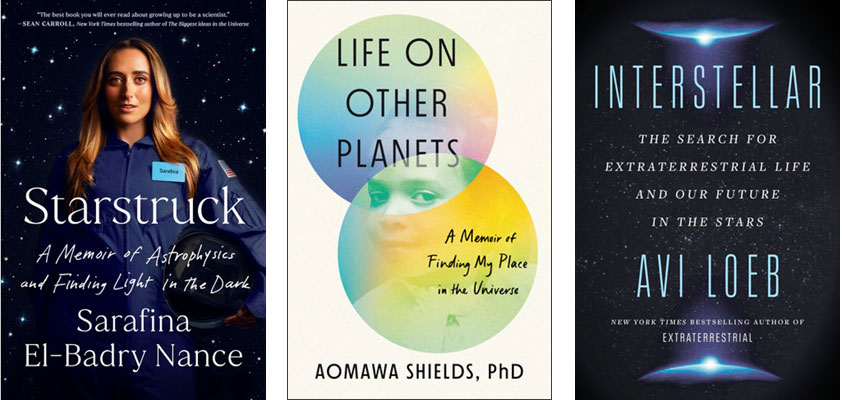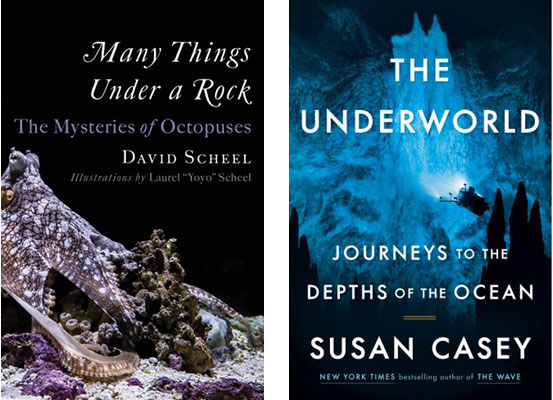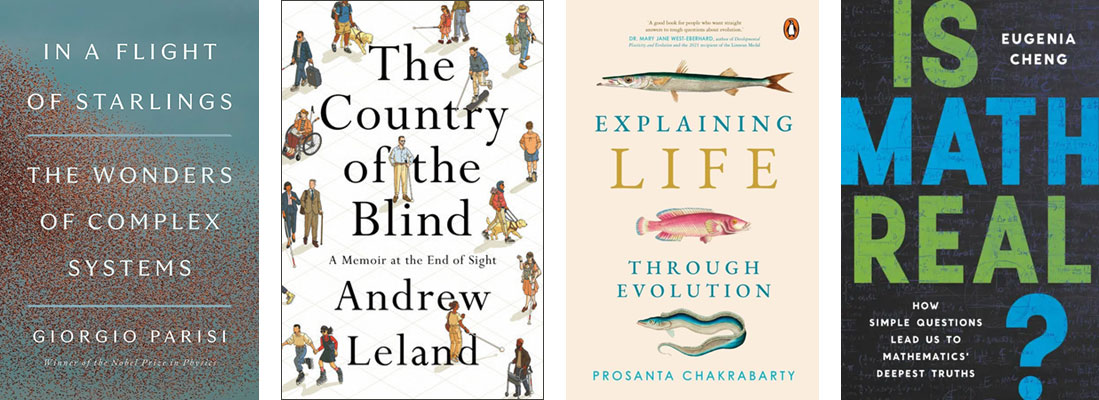Summer STEM Reads You Won’t Want to Miss
By Jaime Herndon
July 12, 2023
From The Staff Astronomy Biology Environment Mathematics Scientists Nightstand
It’s summer time, and that means longer days, warmer weather, and for some of us, more time to read! As a child, when I would come home from summer day camp, there was nothing better than swimming in the pool and then curling up on a chair in the sun with a book or three. Now, as an adult (and parent), I might have less free time to read, but I still love the sight of a stack of books waiting for me.
This summer there are so many great STEM-related books being released. I’ve put together a list of some of them for you, grouped into categories.

Environmental Reads
The American West is a complex place, and Sara Dant takes this on in Losing Eden: An Environmental History of the American West (New Edition), which came out in the beginning of June. She provides a detailed and sprawling history of the area, its environmental history, exploitation of its resources, climate change issues, and political and social issues. The book centers three main themes, and is structured around them: public lands and their creation and protection; finding a balance between economic prosperity and ecological destruction; and creating sustainability. This updated and revised edition of the book brings more multicultural history, incorporates current events, and has a new chapter on climate change, along with new maps and illustrations.
Climate Resilience: How We Keep Each Other Safe, Care for Our Communities, and Fight Back Against Climate Change by Kylie Flanagan (August 1) is a practical, actionable book that’s perfect for an inspiring summer read. Centering voices that typically get pushed aside, such as Native American rights activists, queer liberation ecologists, youth organizers, and Latinx wilderness activists, to name a few, this book shows readers how to move forward toward repairing the earth, collective care, conservation and restoration, and much more. It takes a community-based rather than individual approach, and also provides strategies that readers can use in their own communities.
Summer is a great time for adventures, even the armchair kind! Andrea Lankford’s Trail of the Lost: The Relentless Search to Bring Home the Missing Hikers of the Pacific Crest Trail (August 22) is a perfect for this kind of read. Lankford, a law enforcement officer park ranger with the National Park Service, left the force after more than a decade, burnt out from what she had seen. But 20 years later, she read about three hikers who disappeared from the Pacific Crest Trail without a trace, which struck her as odd. She went on to make contact with the families of the missing hikers, joined amateur Facebook sleuth groups to find out what happened, and became part of search teams. What follows is an unexpected journey of connections with other people, exploring technological ways to find remains, and being reminded of how fierce and unpredictable the natural world can be.

Out-of-This-World Picks
When I was little, there was nothing more I wanted to do than go to Space Camp. I never did get to go, but it was a dream of mine for a long time (believe me, I’ve been eyeing the Family Space Camp). The next best thing is reading about space and associated topics, right? There are several wonderful memoirs out this summer about inspiring scientists who study the cosmos.
Starstruck: A Memoir of Astrophysics and Finding Light in the Dark by Sarafina El-Badry Nance is a memoir you’ll find hard to put down. Ever since childhood, she dreamed of going to space, but she also got the messages—both explicit and implicit—that math and science weren’t for girls. She details the challenges she has faced on her journey through the field of astrophysics: racism, abuse, misogyny, doubt, and illness. It’s a memoir about following your dreams, but also about survival and perseverance, professionally and personally.
Another great memoir coming out on July 11 is Life on Other Planets: A Memoir of Finding My Place in the Universe, by Aomawa Shields. This is a different kind of memoir: Shields always loved the sky, but a year into her astrophysics PhD program, a male professor suggested that she didn’t belong there, as a young Black woman—and so she left the program and was a professional actor, until a day job at NASA brought her back into the field. When she entered another PhD program, she was the oldest doctoral student in her cohort and the only Black student, but that did not deter her. Shields writes honestly about the path she took to become an astronomer and astrobiologist, as well as how she balances parenthood with work.
Avi Loeb is the longest serving chair of Harvard’s Astronomy Department, and his latest book, Interstellar: The Search for Extraterrestrial Life and Our Future in the Stars (August 29), is one you’ll be thinking about long after you finish it. In his 2021 book Extraterrestrial, Loeb claimed that our Solar System had likely been paid a visit by a piece of advanced alien technology. This is a controversial claim, and one that's not widely accepted, especially with the lack of supporting evidence. But if it is true, where do we go now? That’s what Loeb aims to answer in this book. Forget what you’ve seen in the movies. He writes about what contact with extraterrestrial civilizations might actually entail, how science and technology have been preparing for it, and why he feels it is something humans should proactively seek out.

Under the Sea
Summertime brings thoughts of beach trips and the ocean, and what better time to read a book about life in the sea?
Many Things Under a Rock: The Mysteries of Octopuses (June 13) by David Scheel and Laurel “Yoyo” Scheel will have you captivated by octopuses, even if you’ve never really thought about them before. Scheel is a behavioral ecologist who studies octopuses, and in this book he brings the reader into the ocean with him, exploring mysteries and questions. For example, the authors ask, How do the mollusks' bodies work? How can this animal fight sharks and eels even though it is boneless? And how can we study such secretive sea creatures? The wonder at these animals is clear in his writing, and he brings octopuses and their world to life in every chapter.
If you’re craving more underwater adventure, The Underworld: Journeys to the Depths of the Ocean by Susan Casey comes out August 1. Casey goes all over the world, exploring the deepest parts of the ocean and talking with the scientists who study these areas. She covers the history of deep-sea exploration, myths and legends of the ocean, and what the current research tells us about these fascinating areas. How will things like climate change and the fishing and mining industries impact the deep sea? How can we preserve these areas, and what might that look like?

Other Fantastic Choices
In a Flight of Starlings: The Wonders of Complex Systems by Giorgio Parisi (July 11) is a slim book, but don’t let that fool you. By studying the flight of flocks of birds, he has applied principles of physics and found a way to understand various kinds of complex systems. But this book isn’t just about those discoveries—it’s also a book on what he’s learned personally and professionally, and the complex relationship between science and society. He finds wonder in so many things, and writes about it in a joyous, accessible way, making this a really enjoyable read.
If you’re in the mood for a science-related memoir, you’ll want to pick up Andrew Leland’s The Country of the Blind: A Memoir at the End of Sight (July 25). Leland has retinitis pigmentosa, a condition that causes eventual blindness. His vision began to become impaired during adolescence, and now he sees things as though he’s looking through a narrow tube. Knowing how his condition progresses but not knowing exactly when he will completely lose his vision, Leland delves into our society's ableism and issues of accessibility (or lack thereof), explores disability history, blind culture and subcultures, technology and disability, and the ways disability is discussed in both everyday life and in the medical community.
Don’t let the title fool you: Explaining Life Through Evolution by Prosanta Chakrabarty (August 4) is not just a book about evolution. Instead, it’s a fascinating look at the origin story of life on Earth, as well as how the diversity of organisms developed. But it’s not just about history; he also explores how evolution and associated concepts are related to mutations, race, gender, and sexuality, and the evolution of viruses as well. On top of that, the book is a genuinely entertaining read.
As an admittedly math-anxious person, I was skeptical about this one. But Is Math Real?: How Simple Questions Lead Us to Mathematics’ Deepest Truths by Eugenia Cheng (August 15) is a—dare I say—fun read about mathematics, and Cheng’s creativity is on full display with her writing. She shows readers that the inflexible ways in which we’ve been taught to think about math aren’t correct, and unfolds the curiosity and wonder that are hallmarks of the field.
With all of these great science-minded books coming out this summer, the only problem is not having enough time to read them all! Which one will you read first?
American Scientist Comments and Discussion
To discuss our articles or comment on them, please share them and tag American Scientist on social media platforms. Here are links to our profiles on Twitter, Facebook, and LinkedIn.
If we re-share your post, we will moderate comments/discussion following our comments policy.